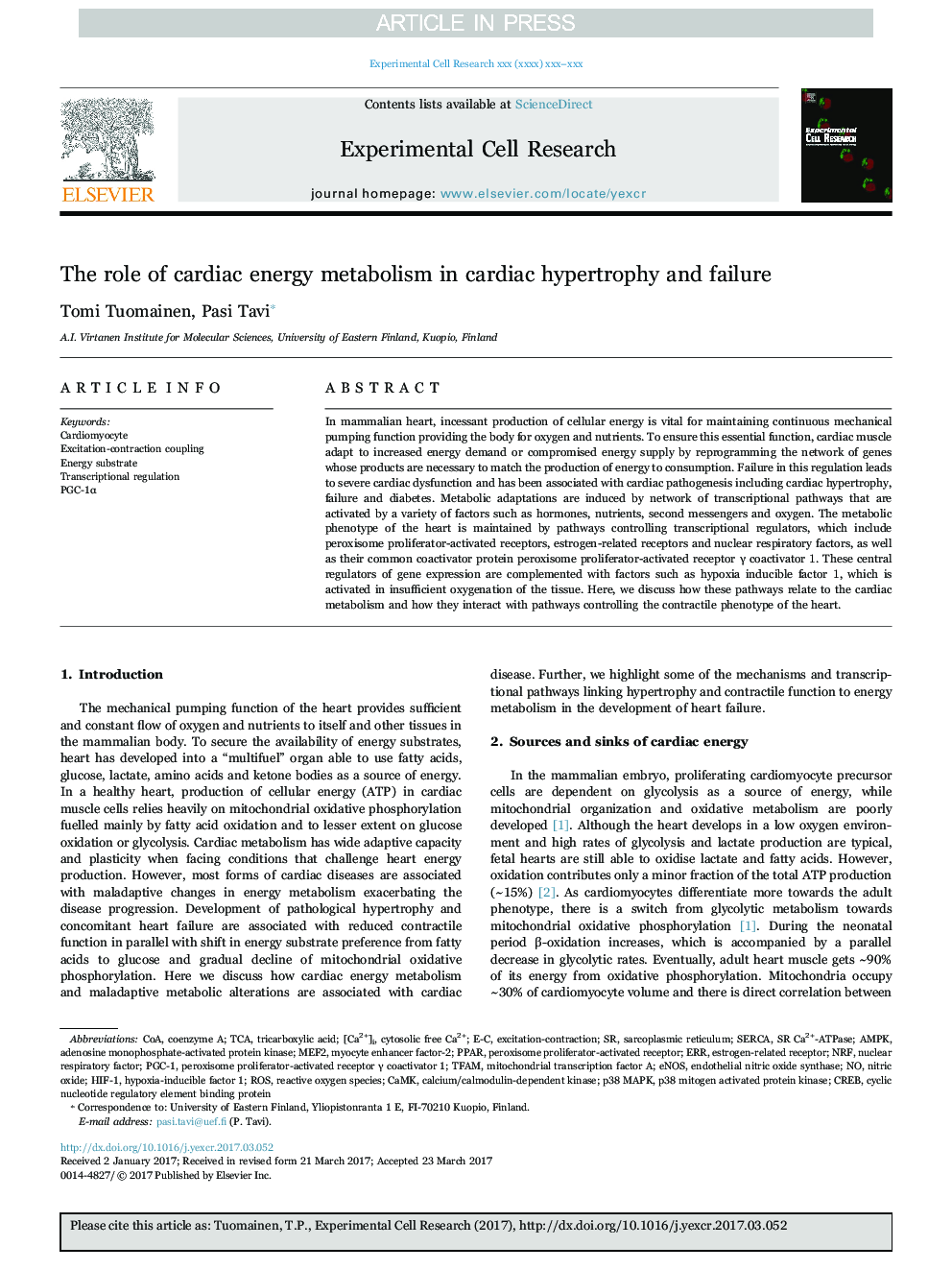| کد مقاله | کد نشریه | سال انتشار | مقاله انگلیسی | نسخه تمام متن |
|---|---|---|---|---|
| 8452132 | 1547701 | 2017 | 7 صفحه PDF | دانلود رایگان |
عنوان انگلیسی مقاله ISI
The role of cardiac energy metabolism in cardiac hypertrophy and failure
ترجمه فارسی عنوان
نقش متابولیسم انرژی قلب در هیپرتروفی قلبی و شکست
دانلود مقاله + سفارش ترجمه
دانلود مقاله ISI انگلیسی
رایگان برای ایرانیان
کلمات کلیدی
CREBE-CPGC-1TFAMPGC-1αERRCaMKCOAeNOSPPARNRFAMPKTCAHIF-1MEF2p38 MAPK - P38 MAPKROS - ROS[Ca2+]i - [Ca2 +] itricarboxylic acid - اسید تری کربوکسیلیکEnergy substrate - بستر انرژیexcitation-contraction - تحریک-انقباضExcitation-contraction coupling - تحریک-انقباض جفت شدنTranscriptional regulation - تنظیم ترانزیتیSarcoplasmic reticulum - رتیکولوم سارکوپلاسمیکendothelial nitric oxide synthase - سنتاز اکسید نیتریک اندوتلیالCytosolic free Ca2+ - سیتوزول آزاد Ca2 +myocyte enhancer factor-2 - عامل افزایش دهنده myocyte-2hypoxia-inducible factor 1 - عامل القایی هیپوکسی 1Nuclear respiratory factor - عامل تنفسی هسته ایmitochondrial transcription factor A - عامل رونویسی میتوکندری ASERCA - قلبCardiomyocyte - قلب و عروقNitric oxide - نیتریک اکسیدcalcium/calmodulin-dependent kinase - وابسته به کلسیم / کالودولین وابسته به کینازadenosine monophosphate-activated protein kinase - پروتئین کیناز فعال شده با آدنوزین مونوفسفاتp38 mitogen activated protein kinase - پروتئین کیناز فعال میتوکندر P38coenzyme A - کوآنزیم AReactive oxygen species - گونههای فعال اکسیژنperoxisome proliferator-activated receptor - گیرنده فعال فعال پروکسیومestrogen-related receptor - گیرنده مرتبط با استروژن
موضوعات مرتبط
علوم زیستی و بیوفناوری
بیوشیمی، ژنتیک و زیست شناسی مولکولی
تحقیقات سرطان
چکیده انگلیسی
In mammalian heart, incessant production of cellular energy is vital for maintaining continuous mechanical pumping function providing the body for oxygen and nutrients. To ensure this essential function, cardiac muscle adapt to increased energy demand or compromised energy supply by reprogramming the network of genes whose products are necessary to match the production of energy to consumption. Failure in this regulation leads to severe cardiac dysfunction and has been associated with cardiac pathogenesis including cardiac hypertrophy, failure and diabetes. Metabolic adaptations are induced by network of transcriptional pathways that are activated by a variety of factors such as hormones, nutrients, second messengers and oxygen. The metabolic phenotype of the heart is maintained by pathways controlling transcriptional regulators, which include peroxisome proliferator-activated receptors, estrogen-related receptors and nuclear respiratory factors, as well as their common coactivator protein peroxisome proliferator-activated receptor γ coactivator 1. These central regulators of gene expression are complemented with factors such as hypoxia inducible factor 1, which is activated in insufficient oxygenation of the tissue. Here, we discuss how these pathways relate to the cardiac metabolism and how they interact with pathways controlling the contractile phenotype of the heart.
ناشر
Database: Elsevier - ScienceDirect (ساینس دایرکت)
Journal: Experimental Cell Research - Volume 360, Issue 1, 1 November 2017, Pages 12-18
Journal: Experimental Cell Research - Volume 360, Issue 1, 1 November 2017, Pages 12-18
نویسندگان
Tomi Tuomainen, Pasi Tavi,
